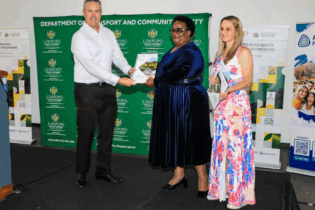Africa is undergoing rapid changes in terms of infrastructure growth and, so too, is the local bituminous industry. Saied Solomons, CEO of the Southern African Bitumen Association chats to IMIESA about developments in the construction industry and why the upcoming Argus Africa Bitumen Conference will be highly informative.
The Southern African Bitumen Association (Sabita) believes the local bituminous products industry will derive great benefit from the inaugural Argus Africa Bitumen 2014 Conference to be held at the RadissonBlu Hotel and Conference centre at the V&A Waterfront in Cape Town from 26 – 27 February. “South Africa is one of the leading industrial and economic forces in a continent that is undergoing rapid infrastructural growth as investment from abroad continues to flow into Africa,” Solomons said. “This dynamic growth, certainly as far as the southern sub-continent is concerned, makes Sabita’s pivotal role in ensuring the implementation of global best practice in the roads industry more important than ever.” He said Sabita’s influence extended to fields as diverse as research and technology development, worker health and safety, environmental conservation, education and training, as well as interaction with stakeholders from all tiers of government, and was directed at ensuring that local products and processes met the highest international standards. Solomons added that the Argus Africa Bitumen Conference where Sabita played a supporting role in the marketing, was both appropriate and timely, given the tight bitumen demand/supply balance currently being experienced in South Africa. “This conference will undoubtedly provide the local industry with valuable insight into the broader dynamics of the international bitumen market, the intricacies of the supply chain and shipping procedures,” Solomons said. Global practice The conference also coincides with the finalisation of the Sabita-sponsored project to bring local industry into alignment with global practice in terms of bitumen specifications.To promote the translation from an empirical to a performance related specification for bituminous binders in South Africa, Sabita engaged the Council for Scientific and Industrial Research (CSIR) to investigate the implementation of test procedures to measure and formulate compliance criteria for the following damage resistance characteristics of bituminous binders:- Viscous deformation
- Resistance to fatigue damage
- Low temperature fracture.
- appropriate stress levels for the multi stress creep recovery
- the binder yield energy test as a monotonic alternative to cyclic tests
- a DSR based procedure to determine stiffness and stress relaxation properties of the binder.
Sabita has also spearheaded a project designed to meet the growing need from road authorities to ensure that asphalt layers perform as expected under a range of environmental and current traffic loading conditions. This has resulted in the development of an up-to-date asphalt mix design method that will replace the procedures developed in 2001. The new method incorporates developments in asphalt technology that have occurred in the global arena over the past decade, and will be aligned to the revised South African Pavement Design Method currently in the making under the auspices of SANRAL.
This Sabita-sponsored project commenced in the early part of 2012 with the CSIR contracted to head the project which was followed by meetings of expert groups to guide the process.
Features of the new manual are the introduction of the concept of performance grade bitumen, its relevance to both hot and warm mix asphalt and the focus on meeting performance related design parameters. A multi-level approach to design for a range of applications and risk profiles is also a new feature.A programme of dissemination and implementation of the method, to be contained in a new Sabita Manual 35: South African asphalt mix design manual will be launched in 2014. Other recent Sabita technological initiatives include:- High modulus asphalt: A 2008 Sabita research programme to develop guidelines and specifications for high modulus asphalt (HiMA) – a technology that combines superior deformation resistance with high structural stiffness and good fatigue performance – came of age in 2013. Repeated assessments of a HiMA trial section on the South Coast Road leading into Durban harbour, over a 24-month period, reported excellent performance and superior load-spreading characteristics. Sabita has now published a guideline that will ensure the wider application of this technology on South Africa’s road network.
- Warm warm mix asphalt (WMA) has been integrated into the arsenal of road construction technologies, mix asphalt/recycled asphalt:After four years of trial, development and testing, and in many cases has replaced hot mix asphalt (HMA) as the preferred option. Manufactured and applied at temperatures from 20-50oC below that of HMA, WMA is characterised by significant reductions in fuel consumption, greenhouse gas emissions and worker health hazards. WMA technology has also, with the addition of certain additives, made it possible to extend both the “compaction window” (the period during which asphalt can be compacted to client specifications) and the viable transport times and distances between plant and paving.
- optional use of extender oils
- permitting a blend of base binders complying with SANS 4001-BT1 to meet the modified binder specification requirements
- recommended practice for utilising over-reacted binder arising from inevitable delays on site
- expansion of the section dealing with occupational health, safety and the environment In the interests of worker safety and sustainable practice.
- the publication of Sabita’s HSE Charter, which commits members to implement best practice HSE techniques in their operations
- a certification scheme (BitCert)which, after auditing and recording compliance with the Charter, leads to HSE certification, with notable benefits for accredited companies;
- an incident reporting scheme (Bitinrep), designed to record and analyse hazard or safety incidents to facilitate avoidance of future incidents
- a Train-the-Trainer safety course (BitSafe) designed to prepare selected representatives to initiate safety training in their own companies
- the publication of HSE guidelines, DVDs and other material designed to benchmark best practice HSE performance in South Africa
- thecreation of an annual Sabita HSE award, presented to individuals who have made great strides in integrating sound HSE practices in the workplace.
- the development and presentation of a Materials Tester Course (MTC) as well as course-specific modules at NQF Levels 1-4
- tertiary level courses devised by Sabita and presented by the South African Road Federation (SARF) on behalf of the Asphalt Academy
- the presentation every four years of the CAPSA conference, acknowledged as a world-class forum for the presentation and evaluation of cutting-edge technology.







